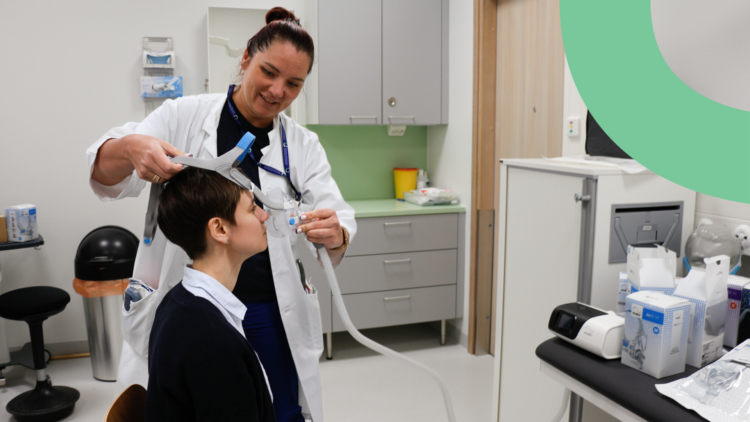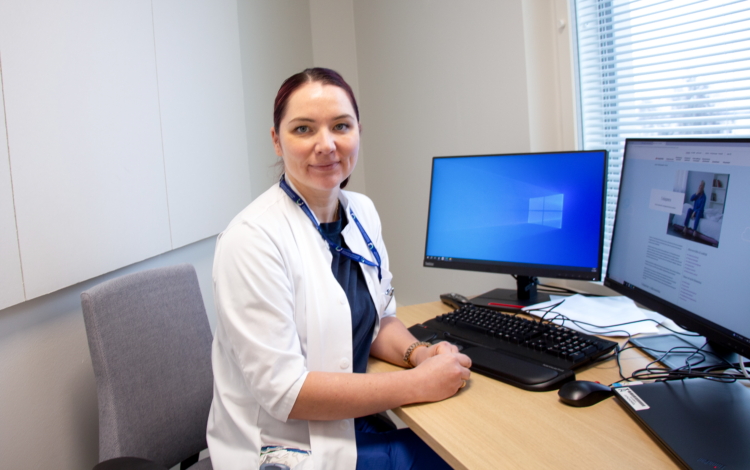Sleep apnoea affects one in four adults

If a need is identified when visiting a doctor, the doctor will write a referral for further examination at a specialist clinic. Sleep apnoea can only be diagnosed with a sleep apnoea examination, where possible breathing interruptions are registered during one night. After the registration night, the device is returned to the hospital and the data obtained from the device is analysed.
– In practice, the hospital gives you a small device with wires e.g. to place on a finger and pulse sensors. During the monitoring, the oxygen content of the breath is seen, the movements of the stomach and chest are monitored, as well as the airflow from the nose and mouth, says Galina Makalova, assistant chief physician for pulmonary diseases.
Up to a third of the referrals to the pulmonary clinic concern sleep apnoea.
Anyone can have sleep apnoea
A person with sleep apnoea can be young, slim, basically healthy or an elderly person with several diseases.
Sleep apnoea is affected by, among other things, being overweight, smoking and other diseases, such as heart disease, diabetes and hypothyroidism.
About a quarter of the adult population suffers from sleep apnoea. And approximately 15 per cent of those suffer from moderate or severe sleep apnoea. Men have somewhat more sleep apnoea than women.
There are 4,400 sleep apnoea devices in use in the Wellbeing Services County of Ostrobothnia

Your own activity is important
The effects of being overweight, smoking or inactivity are discussed with patients when visiting the clinic. There are three degrees of sleep apnoea: mild, moderate and severe. When lifestyle changes are made, the degree of sleep apnoea may improve and device therapy may not be needed.
– If the patient experiences a lot of fatigue symptoms as a result of moderate or severe sleep apnoea, it is difficult to make lifestyle changes. Then we recommend device treatment. When the situation improves, the patient is able to make lifestyle changes, explains Makalova.
Sleep apnoea is a risk factor for health, which is why it is studied and treated.
– Untreated sleep apnoea directly affects the health of the heart. If there are low oxygen levels at night and the patient has other risk factors, their heart is strained both during the day and at night, confirms Makalova.
It is important that patients themselves are actively involved in the treatment of sleep apnoea in order for the situation to go in a better direction. The doctor’s role is to organise device care when it is needed.
Breathlessness often occurs when sleeping on the back. As a posture treatment, you can tape, for example, a tennis ball inside the nightwear, which disturbs the feeling of being on your back.
– If the person has a motorized bed, the bed can be put in a semi-sitting position, or in a regular bed, you can put a couple of pillows under the back so that you can get an elevated position when sleeping, advises Makalova.
Do you sleep well?
We all need sleep. An adult’s need for sleep is from 6–9 hours. During sleep, the cerebrospinal fluid washes the cells in the brain and carries away metabolic waste products. So sleep cleans the brain.
Both shortened and prolonged night sleep is unhealthy and increases the risk of cardiovascular diseases and type 2 diabetes. Poor sleep also leads to poor concentration and memory.
Tips for a good night’s sleep:
• The place to sleep should be calm and cool.
• Don’t try to force yourself to sleep. If you don’t fall asleep within 15 minutes, get out of bed.
• Write down your worries during the day or evening, so you don’t have to worry at night.
• Reduce the use of recreational substances and increase exercise, but do not exercise right before going to bed.
• Eat lightly in the evenings, don’t go to bed hungry.
• A bed is for sleeping and intimacy.
• Spend time with your family and friends.
If you are troubled by insomnia, contact the Customer Service Centre for a care needs assessment regarding the need for treatment. If necessary, a doctor will prescribe melatonin or a sleeping pill.
P.S. On the Omaolo.fi website you can find Sleep Training. Put it to use!
Source: Institute of Health and Welfare THL and Current Care Guidelines (Käypä hoito) recommendations.
The article was published in Kotikäynti magazine, issue 1/2024
Text: Johanna Jussila
Photographs: Heidi Kurvinen & Johanna Jussila